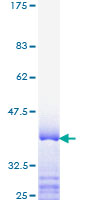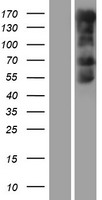order histories, retained contact details for faster checkout, review submissions, and special promotions.
Forgot password?
order histories, retained contact details for faster checkout, review submissions, and special promotions.
Locations
Orders Processing,
Shipping & Receiving,
Warehouse
2 Shaker Rd Suites
B001/B101
Shirley, MA 01464
Production Lab
Floor 6, Suite 620
20700 44th Avenue W
Lynnwood, WA 98036
Telephone Numbers
Tel: +1 (206) 374-1102
Fax: +1 (206) 577-4565
Contact Us
Additional Contact Details
order histories, retained contact details for faster checkout, review submissions, and special promotions.
Forgot password?
order histories, retained contact details for faster checkout, review submissions, and special promotions.
MED1 / TRAP220
mediator complex subunit 1
The activation of gene transcription is a multistep process that is triggered by factors that recognize transcriptional enhancer sites in DNA. These factors work with co-activators to direct transcriptional initiation by the RNA polymerase II apparatus. The protein encoded by this gene is a subunit of the CRSP (cofactor required for SP1 activation) complex, which, along with TFIID, is required for efficient activation by SP1. This protein is also a component of other multisubunit complexes e.g. thyroid hormone receptor-(TR-) associated proteins which interact with TR and facilitate TR function on DNA templates in conjunction with initiation factors and cofactors. It also regulates p53-dependent apoptosis and it is essential for adipogenesis. This protein is known to have the ability to self-oligomerize.
| Gene Name: | mediator complex subunit 1 |
| Synonyms: | MED1, ARC205, CRSP1, DRIP205, DRIP230, Mediator complex subunit 1, PBP, PPARG binding protein, RB18A, TRIP-2, TRIP2, PPARBP, CRSP200, p53 regulatory protein RB18A, PPAR binding protein, PPAR-binding protein, PPARGBP, TR-interacting protein 2, TRAP220 |
| Target Sequences: | NM_004774 NP_004765.2 Q15648 |
Publications (1)





If you do not find the reagent or information you require, please contact Customer.Support@LSBio.com to inquire about additional products in development.









